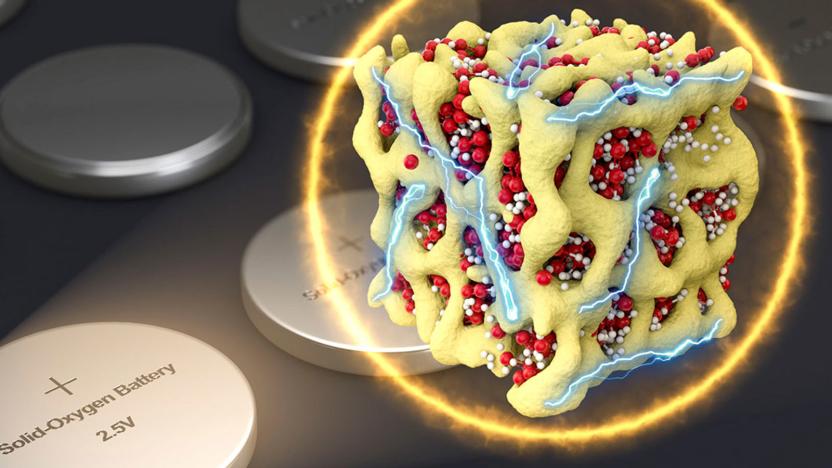lithium-air
Latest

Lithium-oxygen battery promises lighter electric cars
Lithium-air batteries are supposed to lead to lighter, longer-ranged electric cars thanks to their high power-to-weight output, but they have some showstopping flaws: they not only degrade rapidly, but waste a lot of energy input as heat. Neither is exactly ideal in a vehicle that's expected to last you several years and charge quickly. Scientists at MIT, Argonne National Laboratory and Peking University might have found a better way, though. They've engineered a lithium-oxygen battery that offers the light weight of lithium-air without its drawbacks.

Toyota and BMW make it official, commit to green vehicle technology partnership
We're well aware Toyota and BMW are pretty good pals, but details of their ongoing study sessions on green vehicle tech have been vague thus far. The trickle of information continues, and today the companies met to autograph more bits of paper and clasp hands for the camera. New binding agreements were signed to reaffirm deals inked in March and June last year, and their research into next-generation lithium-ion batteries has been expanded to cover the lithium-air kind (hopefully, they are less flammable). Work on making vehicles lighter continues, and they expect to complete development of an inclusive fuel cell system by the distant target of 2020. Expect to see some fruits of BMW and Toyota's labor before then, though, as they intend to "define a joint platform concept for a mid-sized sports vehicle" by the end of the year. Don't get too excited -- we imagine that jargon means we'll be privy to a few bits of artwork and some inspirational words come the deadline. If you'd like to know more about the evolving partnership, check out the source links below.

IBM kicks off Battery 500 Project to boost EV range, 500 miles or bust
Electric cars certainly can look nice and promise big things, but the ones we can actually buy today rarely top 50 miles of range. Those promised for the next few years probably won't break 100, and they're not going to find wide success until things get a lot better in that department. That's the initiative of IBM's Battery 500 Project, bringing together a number of the brightest minds in anode/cathode tech to boost battery storage density by a factor of 10. The focus is on lithium-air technology, which uses nanoscale semiconductors and an open design relying on the air around us for collecting positive ions. About 40 brains are involved in the project at this point, and we think their work is of vital importance. So, if you would, please stop posting funny things on the internet until they've come up with a solution. We'd like them to be able to focus completely without any LOLcat distractions. [Via Slashdot]

Waterproof lithium metal-air batteries could revolutionize portable power
We've already seen some zinc-air batteries hit the market, and now it sounds like lithium-based cells will be the next type to use air as a cathode. The only problem? Those of you who were awake in 10th grade chemistry might remember that exposing lithium metal to water causes it to explode -- which is why a company called PolyPlus has partnered with the government to develop a unique waterproof lithium metal-air battery that keeps the boom-boom in but lets the buzzy-buzz out. The coating allows lithium ions to seep out while preventing water from getting in, and because the membrane protects the cell, the battery won't discharge in storage. If that sounds a little pie-in-the-sky, well, it is -- PolyPlus founder Steven Visco called lithium metal "the holy-grail battery material." Us, we're a little more skeptical, but we're loving the sounds of prototypes that deliver the juice of current laptop batteries at one-fifth the weight -- hook us up, boys.


